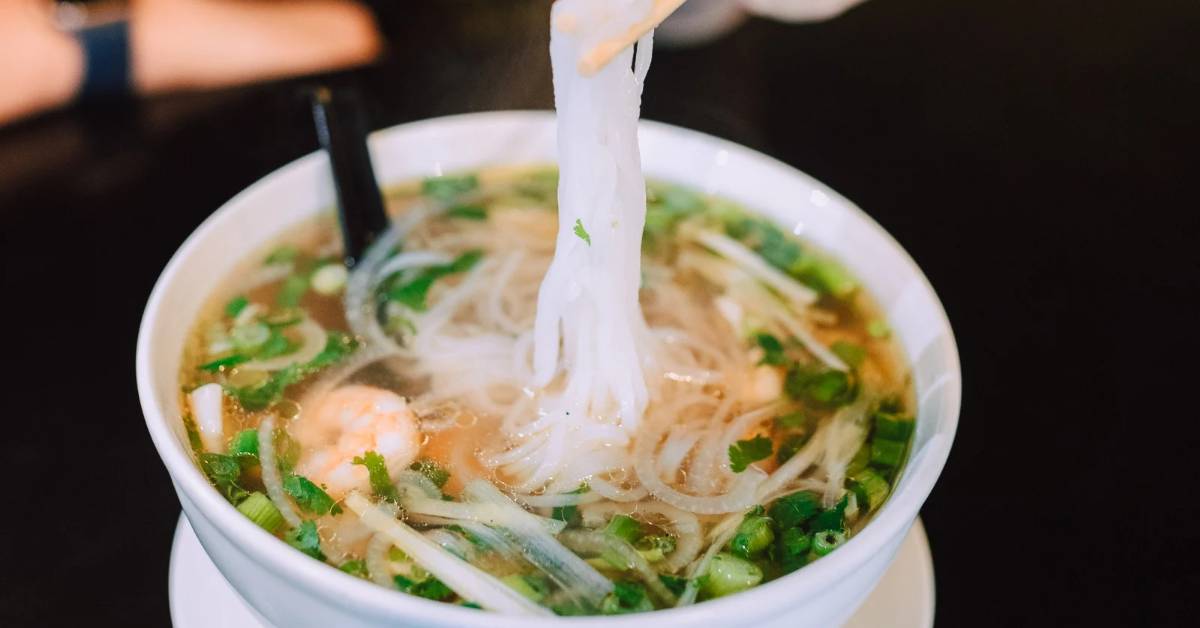
If you’ve recently had your wisdom teeth removed, you’re probably wondering what foods you should avoid to ensure a smooth recovery. While it may be tempting to indulge in your favorite comfort foods, it’s important to be mindful of what you eat during this time. One dish that you may want to steer clear of is pho, a popular Vietnamese noodle soup.
If you have just had your wisdom teeth removed, you may be wondering what foods are safe to eat. While pho may seem like a soft and easy-to-eat option, it is important to understand the risks associated with consuming this dish during the healing process.
Reason 1: Risk of Infection
After wisdom teeth removal, your mouth is vulnerable to infection. Pho, a Vietnamese noodle soup, contains many ingredients that can increase the risk of infection. Here are some reasons why:
- Raw sprouts: Many pho recipes include raw bean sprouts. While they are a healthy addition, they can also harbor bacteria like E. coli or Salmonella, which can cause serious infections.
- Uncooked meat: Pho typically includes thin slices of raw beef or chicken, which can also contain harmful bacteria. Eating raw meat can increase your risk of infection and slow down the healing process.
- Spices and herbs: Pho is often flavored with spices and herbs like cilantro, basil, and chili peppers. While they can add flavor to the dish, they can also irritate the surgical site and cause discomfort.
- Broth temperature: Pho is served piping hot, which can be dangerous for your healing mouth. Hot liquids can dissolve blood clots and cause bleeding, which can lead to infection.
To minimize your risk of infection after wisdom teeth removal, it’s best to avoid pho and other foods that can irritate the surgical site. Instead, opt for soft, nutrient-rich foods like mashed potatoes, smoothies, and yogurt. These foods can help speed up the healing process and reduce your risk of complications.
Reason 2: Difficulty Chewing

After wisdom teeth removal, you may experience difficulty chewing, which can make it challenging to eat certain foods, including pho. The extraction site can be swollen and sore, making it difficult to open your mouth wide enough to chew food properly.
Pho is a noodle soup that contains various ingredients, such as meats, vegetables, and noodles. The noodles used in pho are typically long and thin, which can be difficult to chew if you are experiencing any discomfort in your mouth. The meat used in pho is usually thinly sliced, which can also be challenging to chew if you are having difficulty opening your mouth.
Additionally, pho is often served hot, which can irritate the extraction site and cause further discomfort. The broth in pho is also typically flavored with spices and herbs, which can be irritating to the extraction site and prolong the healing process.
If you are craving pho after wisdom teeth removal, alternative options are easier to chew and less likely to cause discomfort. Soft foods such as mashed potatoes, smoothies, and broth are good options for the first few days after surgery. As you begin to heal, you can gradually introduce more solid foods into your diet.
In summary, pho can be difficult to eat after wisdom teeth removal due to its texture, temperature, and flavor. It is important to listen to your body and avoid any foods that cause discomfort during the healing process.
Reason 3: High amount of sodium
Secondly, pho often contains high levels of sodium, which can lead to dehydration and inflammation. This can make it more difficult for your body to heal and can prolong your recovery time. Moreover, pho is often loaded with MSG, a flavor enhancer that can trigger headaches and other uncomfortable symptoms, which can be especially unpleasant when you’re already dealing with the pain and discomfort of wisdom teeth removal.
Reason 4: Delayed Healing
Pho is a complex dish that often contains a variety of ingredients, including noodles, meats, and vegetables. While these ingredients may seem harmless, they can actually slow down the healing process after wisdom teeth removal.
Chewing on noodles or tough meats can cause irritation to the surgical site and delay the healing process. Additionally, the spices and herbs used in pho can cause inflammation and further discomfort.
Sticking to soft, easy-to-eat foods for at least the first few days after surgery is important. This will help to promote healing and reduce the risk of complications.
In conclusion, while pho may be a tempting option after wisdom teeth removal, it is important to understand the risks associated with consuming this dish during the healing process. By avoiding hot foods and drinks and sticking to soft, easy-to-eat foods, you can promote healing and reduce the risk of complications.
Interesting Post: 4 Ways How To Safely Remove Food Stuck In Wisdom Tooth Hole!
Alternatives to Pho
If you’ve recently had your wisdom teeth removed, you may be craving a warm and comforting bowl of pho. However, it’s important to avoid any hot or spicy foods that can irritate the socket or gums. Here are some alternatives to pho that are gentle on your mouth and won’t cause any discomfort.
Soft Foods to Eat After Wisdom Teeth Removal
After wisdom teeth removal, it’s important to stick to soft foods that won’t require much chewing. Here are some soft foods that you can try instead of pho:
- Applesauce or other pureed fruits
- Mashed soft fruit such as bananas or avocado
- Steamed mashed vegetables such as carrot or cauliflower
- Warm (not hot) broth or cream soups
- Oatmeal, congee, porridge, or cream of wheat
- Yogurt or smoothies
- Jell-O, pudding, and ice cream
These foods are easy to eat and won’t cause any pain or discomfort. They are also packed with nutrients that can help you recover faster.
Foods to Avoid After Wisdom Teeth Removal
While you’re recovering from wisdom teeth removal, there are certain foods that you should avoid to prevent any complications. Here are some foods to avoid:
- Hot or spicy foods
- Crunchy or hard foods such as chips, nuts, or popcorn
- Sticky or chewy foods such as caramel or gum
- Acidic foods such as citrus fruits or tomatoes
- Carbonated drinks or alcohol
These foods can irritate the socket or gums and slow down the healing process. Stick to soft, bland foods until you’ve fully recovered.
In conclusion, while pho may be tempting, it’s important to avoid any hot or spicy foods after wisdom teeth removal. Stick to soft, nutrient-rich foods that won’t cause any discomfort. By following these guidelines, you’ll be on your way to a speedy recovery.
Frequently Asked Questions
After getting your wisdom teeth removed, you may be wondering if you can eat pho. Here are some frequently asked questions about eating pho after wisdom teeth removal.
What should I avoid when eating pho after wisdom teeth removal?
You should avoid adding any spices or eating the soup too hot. Also, avoid any meats that are tough or chewy, such as beef brisket or tendon. Soft meats like chicken or shrimp are good options. Furthermore, avoid any toppings that are hard or crunchy, such as bean sprouts or peanuts.
How long should I wait to eat pho after wisdom teeth removal?
It is recommended that you wait at least 24 hours before eating any solid foods. Start with soft foods like broths or smoothies and gradually work your way up to more solid foods like pho. It is important to listen to your body and not push yourself too hard.
What should I do if I experience pain while eating pho after wisdom teeth removal?
If you experience pain while eating pho after wisdom teeth removal, stop eating and wait for the pain to subside. You can also try taking over-the-counter pain medication like ibuprofen or acetaminophen. If the pain persists, contact your dentist or oral surgeon for further advice.








